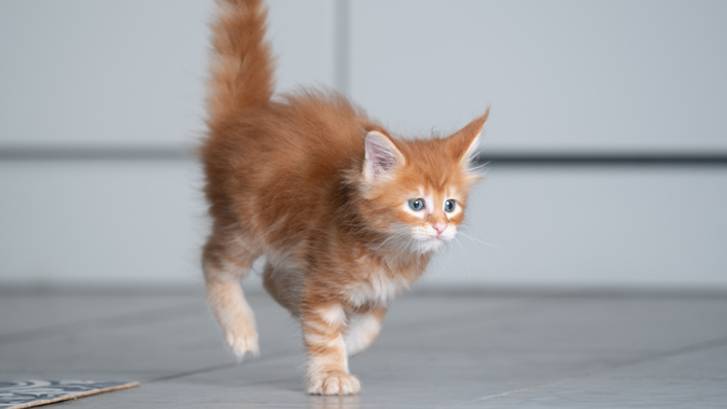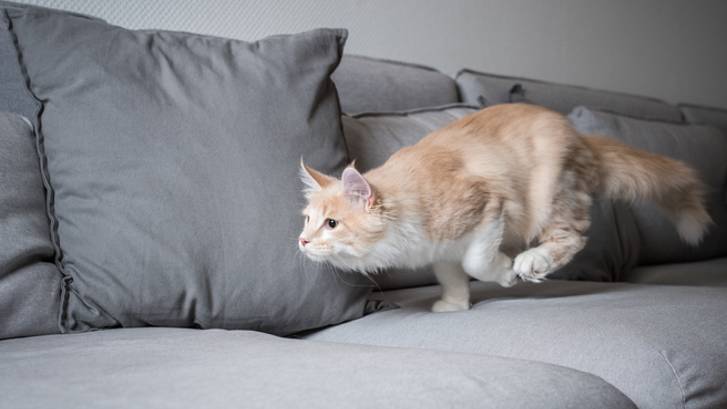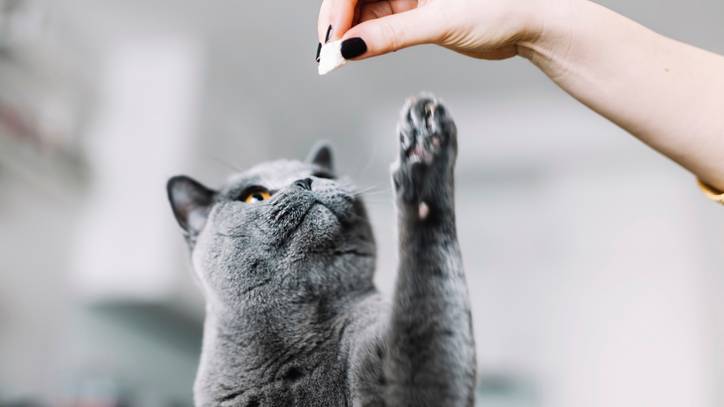Cat zoomies: What are they and why do cats get them?
Does your household get treated to or irritated by the occasional episode of cat zoomies? What is this behavior, and what does it mean?

Get the best advice, tips and top tech for your beloved Pets
You are now subscribed
Your newsletter sign-up was successful
Picture the scene: it's 3am, and you and your family are sleeping soundly until the unwelcome sound of cat zoomies disturbs the peace. A bit of a pain, right?
While us humans love nothing more than enjoying a well-earned spot of shut-eye in the evening, our feline friends often have other ideas. Although cats are not nocturnal, they are crepuscular which means that they’re most active at dusk and dawn and likely to be heard making a ruckus at inopportune moments.
So, if your feline friend is prone to episodes of cat zoomies, also known as Frenetic Random Activity Periods, is this normal? And is there anything you can do to control your cat's random outbursts?
Well, for the comfort and wellbeing of you, as well as your human and furry family members, read on to find out all about cat zoomies.
What is a cat zoomie?
Cat zoomies are those moments of overexcitement or stress that affect some cats. If your cat is prone to cat zoomies, you might recognise these episodes as a mad half-hour where your cat races around frantically.
This behavior is also known as Frenetic Random Activity Periods or frapping. Frapping episodes might include other signs of excitability or stress, including dilated pupils, yowling, climbing, and pouncing.
How long do cat zoomies last?
Cat zoomies tend to be reasonably short, lasting anywhere from a couple of minutes to half an hour. Although that doesn't sound like a long time, it may feel much longer if you're trying to sleep or fruitlessly trying to protect your new curtains or furniture from scratching claws!
Get the best advice, tips and top tech for your beloved Pets

What does it mean when cats do zoomies?
You’re probably wondering why cats get the zoomies and whether it's normal. Well, cat zoomies are a natural behavior that most cats will display at some time or other. However, it's most commonly seen in young and indoor cats.
Although occasional frapping episodes are pretty normal, they can also signify that your cat is stressed, frustrated, or isn't getting the mental or physical stimulation they need. If your cat is left alone for long periods, for instance, they may become bored, anxious, or stressed.
You might even notice other stress signs like overgrooming, urinary issues, or pooping outside the litter box. Cat zoomies are also common after eating, perhaps because your cat has plenty of energy to burn off!
How do you stop a cat from doing zoomies?
Watching your cat racing around frantically doing zoomies can seem funny. But, if it's happening too often, it might be a sign that they're bored or under-stimulated. Not only that but regular cat zoomies are bound to take their toll on your relationship with your cat, especially if they're noisy or destructive.
1. Keep them stimulated
The best way to ensure that your cat isn't feeling frustrated or anxious is to keep them entertained and stimulated. It's particularly important to know how to keep indoor cats entertained. You can do this by interacting with them frequently and engaging in regular playtime.
Follow these links if you're looking for a guide on the best cat toys to buy for your feline friend or you’re not sure how to play with your cat to keep them occupied.
2. Create a calming environment
If you've tried increasing the time you spend with your cat, and they're still seeming wound-up or stressed, there are a few more things you could try. First, you could try using anti-anxiety sprays or diffusers, reducing noise, and generally creating a calmer environment to help your furry friend settle. This might even have the added benefit of helping your cat to sleep at night.
3. Feed small amounts more frequently
Finally, to stop your cat from having huge spikes in their energy levels, you could try feeding them small amounts more frequently throughout the day. Using puzzle feeders can be a handy tool to entertain them while controlling their eating.

When to visit your veterinarian
It's essential to recognise the signs that your cat might be suffering from stress, boredom, or under-stimulation. Feline stress can quickly lead to skin problems caused by overgrooming, and stress-induced cystitis can lead to a blocked bladder, which is a life-threatening condition.
So, if your cat seems unwell at all, or you've noticed bald patches or sore skin, it's time to call the veterinarian. Equally, if your cat is passing urine more frequently, is straining, or you've noticed blood when they pee, they need a veterinary check-up.
However, if your cat seems well aside from their regular zoomies, it's best to try to increase their mental and physical stimulation before calling the veterinarian. If things haven't improved after a couple of weeks, though, give your veterinary team a call for advice.
Cat zoomies can seem quite entertaining to onlookers. After all, who doesn't enjoy watching their cat race around, seemingly having a whale of a time? Well, it turns out that cat zoomies aren't necessarily a good thing, and if done too frequently, they could be a sign that your poor puss is feeling a bit bored or even a bit anxious.
By trying some of the methods in this article, you might be able to reduce your cat's zoomie episodes. Still, if you're concerned about them and their energetic outbursts, you should ask your veterinarian for advice.
Want to learn about other weird cat behaviors? Check out this expert's guide. Or find out the answer to 'why do cats play at night?'
Dr Hannah Godfrey is a small animal vet who graduated from the Royal Veterinary College in 2011 and began work straight away at a busy mixed practice. Initially, she treated all species, but focussed on small animals from 2014. She has a passion for soft tissue surgery, ultrasound, and canine and feline dentistry, having completed additional training in these areas.

